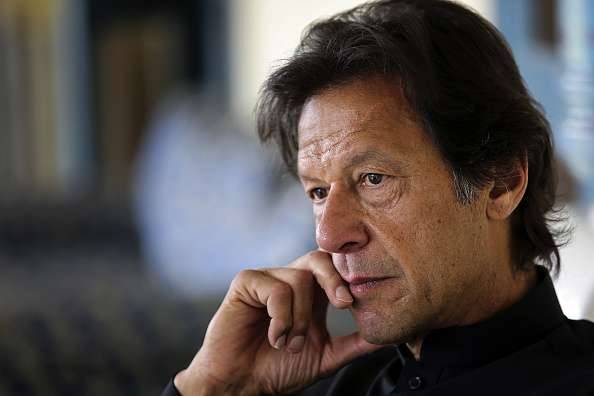Imran Khan Pti
PTI (@PTIofficial) January 5, 2019. The stark difference is further mentioned in the caption of the post, 'Prime Minister Imran Khan believes in humanity and minority rights. Kartarpur corridor is proof of this. Adobe photoshop. While in India minorities are murdered in the name of religion. This is the difference which makes Imran Khan an esteemed leader.'
Imran Khan has been accused of risking bloodshed for electoral gain after the former cricketer-turned-politician offered a full-throated defence of Pakistan’s strict blasphemy laws in the run-up to the general election on 25 July.
- Imran Khan Niazi is a Pakistani Politician leading Pakistan Tehreek e insaf (PTI), legislator, former cricketer and humanitarian who drives the Pakistan Movement of Justice and an individual from the National Assembly of Pakistan.
- Pakistan Tehreek-e-Insaf (PTI) (Urdu: پاکستان تحريک انصاف , 'Pakistan Movement for Justice') is a centrist political party in Pakistan founded in 1996 by former international cricket captain and current Prime Minister of Pakistan Imran Khan.
“We are standing with Article 295c and will defend it,” said the leader of the Pakistan Tehreek-e-Insaf (PTI) at a gathering of Muslim leaders in Islamabad on Saturday, referring to the clause of the constitution that mandates the death penalty for any “imputation, insinuation or innuendo” against the prophet Muhammad.
Khan, 65, also directed anger at the rival party in the electoral race, the Pakistan Muslim League-Nawaz (PML-N), by resurfacing controversy over its hastily withdrawn edits to an electoral oath last year, which Islamists deem blasphemous.
Few politicians dare to speak out against Pakistan’s blasphemy laws: the last to prominently do so, Sen Salmaan Taseer, was assassinated in 2011, and a new political party formed in honour of his killer, Tehreek-e-Labbaik (TLP), has thrust its way into the election campaign, fielding almost as many candidates as the established parties.
Increasing hysteria around the blasphemy laws has led to the targeting of minorities, fake allegations and at least 69 vigilante murders since 1990.
Polls suggest a neck-a-neck vote and critics accused Khan of using the blasphemy issue to win support from religious rightwingers, a not uncommon tactic in Pakistani politics.
Taseer’s son Shahbaz told the Guardian: “My father was a hero and a champion for change. He wanted amendments in this barbaric law.
“Imran Khan is a coward; he is supporting murderers and mob violence. This law is persecuting people, it is not respecting our prophet.”

Khan launched the PTI’s manifesto at a press conference in Islamabad on Monday, promising to turn Pakistan into an Islamic welfare state, create 10m jobs and work for Pakistanis without “religious discrimination”.
In recent weeks, the PTI has appeared to capitalise on the controversy surrounding Khatam-e-Nabuwwat, the election oath taken by incoming politicians that includes swearing on the finality of the prophet Muhammad. Forest hill drive j cole.
Islamists claim the PML-N watered down the oath last year to relax strictures on the Ahmadiyya, a widely persecuted Islamic sect that believes another prophet may have followed Muhammad.
Several PTI candidates have flagged up the controversy in campaign speeches, while religiously minded politicians in Punjab have flocked to join the party.
“Ahmadis will be targeted and murdered as a result,” said Shahbaz Taseer. On Saturday, gunmen stormed the home of the leader of the Ahmadi youth community in Faisalabad, killing him and his wife. A 2017 report by the community recorded rising persecution, including four “hate crime” murders and 77 arrests under discriminatory religious laws.
Khan’s embrace of the blasphemy laws contrasts with earlier statements. In his 2011 autobiography, Pakistan: A Personal History, the PTI leader lamented that no action was taken against mullahs who “arguably incited murder in the period of fevered debate [around blasphemy] that led up to the shooting [of Salmaan Taseer]”.
On Saturday, the human rights activist and election candidate Jibran Nasir refused a member of the public’s request to label Ahmadis non-Muslim. “My politics doesn’t revolve around religion even if it costs me votes,” he tweeted, adding that allegations of a conspiracy against the blasphemy laws “are not the change we are expecting from the PTI”.
“It is extremely sad that we are not progressing from the Zia era”, he added, referring to the 1970s rule of Gen Zia-ul-Haq, who tightened blasphemy laws.
Analysts queried whether Khan, who is widely tipped to be the next prime minister amid widespread allegations that the military establishment is lined up against the PML-N, needed to raise the issue at all. On Friday, the chief of the PML-N, Nawaz Sharif, was sentenced to 10 years in prison for corruption.
Fasi Zaka, a pundit, said: “I’m surprised he’s done it after the announcement of the verdict. Now that his opponent is severely crippled, it’s needless.”
Who's in charge in Pakistan? Is it Imran Khan, the cricket hero-turned-prime minister? Or is it the army, led now by General Qamar Bajwa?
'All institutions in the country are on the same page,' said Waleed Iqbal, a leader from Khan's Pakistan Tehreek-e-Insaf (PTI) party, during a special broadcast of News Today from Lahore.
Imran Khan Pti Instagram
'The foreign minister of Pakistan, in his first press conference, had articulated that the foreign policy of this country will be made here,' Iqbal said as he gestured with his finger, adding: 'He was standing in the foreign office.'
Imran Khan Pti Twitter
'All concerned authorities or institutions of the state would have their input, but it would be the civilian government headed by the prime minister which would be calling the shots,' he said.
Imran Khan Pti Song
'The establishment and the government are on the same page,' said Mehmal Sarfaraz, a senior journalist. The government has said so itself, she explained.
Also on the panel, moderated by Rajdeep Sardesai and Geo News's Muneeb Farooq, were Pakistan Muslim League-Nawaz leader Uzma Bukhari and India Today Group Editorial Director (Publishing) Raj Chengappa.
WATCH Kartarpur corridor: New beginning of India-Pakistan ties or false dawn?